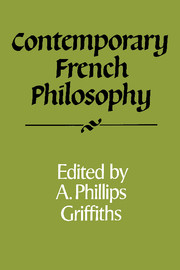Book contents
- Frontmatter
- Contents
- Preface
- Continental Insularity: Contemporary French Analytical Philosophy
- The Misprision of Pragmatics: Conceptions of Language in Contemporary French Philosophy
- Ants and Women, or Philosophy without Borders
- Motifs towards a Poetics
- The Relevance of Cartesianism
- The Enlightenment without the Critique: A Word on Michel Serres' Philosophy
- The Teleological and Deontological Structures of Action: Aristotle and/or Kant?
- The Crisis of the Post-modern Image
- Merleau-Ponty and the Phenomenology of Perception
- Epistemological History: The Legacy of Bachelard and Canguilhem
- History as Genealogy: An Exploration of Foucault's Approach to History
- Beyond Deconstruction?
- Further Adventures of the Dialectic: Merleau-Ponty, Sartre, Althusser
- Paradoxes of the Pineal: From Descartes to Georges Bataille
- Notes on Contributors
- Index
The Enlightenment without the Critique: A Word on Michel Serres' Philosophy
Published online by Cambridge University Press: 25 May 2010
- Frontmatter
- Contents
- Preface
- Continental Insularity: Contemporary French Analytical Philosophy
- The Misprision of Pragmatics: Conceptions of Language in Contemporary French Philosophy
- Ants and Women, or Philosophy without Borders
- Motifs towards a Poetics
- The Relevance of Cartesianism
- The Enlightenment without the Critique: A Word on Michel Serres' Philosophy
- The Teleological and Deontological Structures of Action: Aristotle and/or Kant?
- The Crisis of the Post-modern Image
- Merleau-Ponty and the Phenomenology of Perception
- Epistemological History: The Legacy of Bachelard and Canguilhem
- History as Genealogy: An Exploration of Foucault's Approach to History
- Beyond Deconstruction?
- Further Adventures of the Dialectic: Merleau-Ponty, Sartre, Althusser
- Paradoxes of the Pineal: From Descartes to Georges Bataille
- Notes on Contributors
- Index
Summary
Il n'est de pur mythe que l'idée d'une science pure de tout mythe
La Traduction, p. 259The French, it is well known, love revolutions, political, scientific or philosophical. There is nothing they like more than a radical upheaval of the past, an upheaval so complete that a new tabula rasa is levelled, on which a new history can be built. None of our Prime Ministers starts his mandate without promising to write on a new blank page or to furnish a complete change in values and even, for some, in life. Each researcher would think of him or herself as a failure, if he or she did not make such a complete change in the discipline that nothing will hereafter be the same. As to the philosophers they feed, from Descartes up to Foucault's days, on radical cuts, on ‘coupure épistémologique’, on complete subversion of everything which has been thought in the past by everybody. No French thinker, indeed no student of philosophy, would seriously contemplate doing anything short of a complete revolution in theories. To hesitate, to respect the past, would be to compromise, to be a funk, or worse, to be eclectic like a vulgar Anglo–Saxon!
The revolutions were to be so deep and so complete that they left nothing intact of what they had subverted. In the new order of things, and only there, there was everything needed to think—until, that is, a new upheaval relinquished this order to the same obscurity.
- Type
- Chapter
- Information
- Contemporary French Philosophy , pp. 83 - 98Publisher: Cambridge University PressPrint publication year: 1989
- 3
- Cited by



